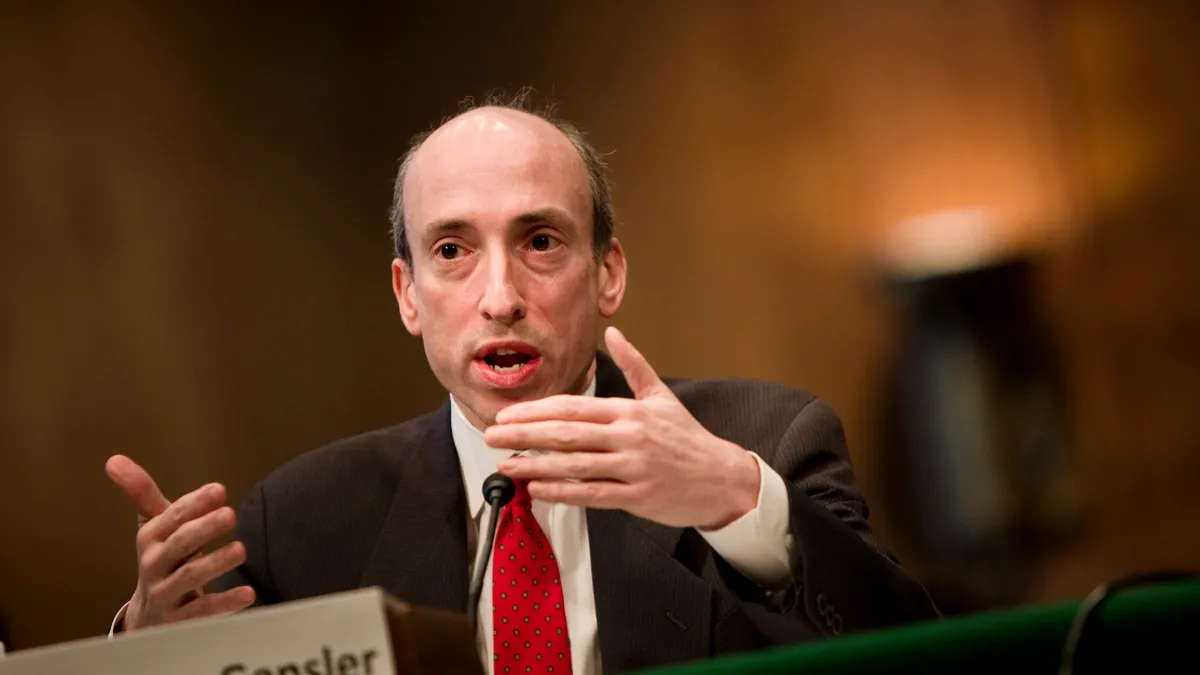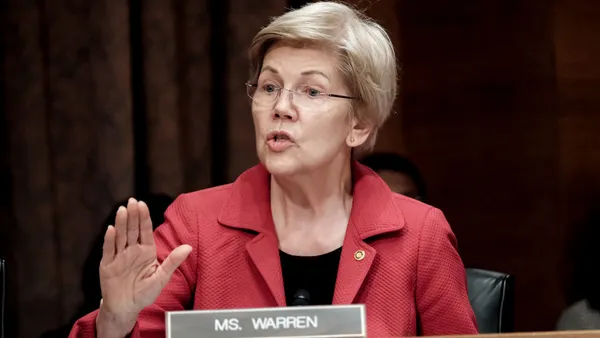Dive Brief:
- The Securities and Exchange Commission has not yet released a final rule requiring disclosure on climate risk partly because of public concern that companies would need to report Scope 3 carbon emissions across their supply chains, the agency’s chair, Gary Gensler, said Tuesday.
- The SEC has received more than 16,000 public comment letters about the climate risk disclosure rule that it proposed in March 2022, with many asserting that Scope 3 reporting will prove onerous for small businesses, Gensler said. “We got a lot of comments around what’s called Scope 3 disclosures, and that’s what we’re trying to move forward on,” he said in testimony to the Senate Banking Committee.
- Gensler declined to estimate when the SEC will adopt a final regulation, while noting that rule revisions can take from 12 to 24 months. “We try not to do things against the clock,” he said, adding “it’s really when the staff is ready and the [five-member agency] commission is ready.”
Dive Insight:
Republicans on the banking committee criticized Gensler for what they characterized as an extreme regulatory push by the SEC since his swearing-in as agency chief in April 2021.
“The regulations the SEC has proposed under your leadership are unjustified and are sowing discord and confusion for industry and market participants,” the panel’s chair, Sen. Tim Scott, R-SC, told Gensler. “The breakneck pace you're pumping out regulation should not be applauded.”
Gensler pushed back, saying that the 22 rules adopted so far under his leadership are fewer than those advanced by each of his three predecessors during their first 28 months.
Republicans on the House Financial Services Committee, during a series of hearings in July, stepped up their opposition to the climate risk disclosure proposal and to efforts by shareholders, Democrats and other stakeholders to promote environmental, social and governance best practices.
Republican lawmakers in the Senate and House have said that the SEC and ESG activists undermine capitalism, harm Main Street investors and thwart company efforts to increase shareholder value.
The SEC also plans to release rules on corporate board diversity and “human capital management disclosure.”
Referring to the proposed requirement that companies report carbon emissions and climate risk, Gensler said “many U.S. issuers are already disclosing climate risk information and investors are making investment decisions” based on the information. The SEC, for the sake of investors, aims to ensure the reports are consistent and comparable, he said.
“We have no climate agenda whatsoever,” he said. “We’re not climate regulators.”
Gensler came under fire, too, from the other side of the aisle, as Sen. Elizabeth Warren, D-MA, criticized him for not pushing through the disclosure rule sooner.
“When you were nominated two-and-a-half years ago, you said the giant corporation should not be able to hide their climate risks from investors,” Warren told Gensler. “Without a strong climate risk disclosure rule that is exactly what companies will continue to do.
“You have a mandate to protect investors, you have strong public support to do this, and I just want to say it is time for you to get this job done,” she said, echoing 80 House Democrats who urged Gensler last month to quickly secure adoption of the rule.
“You have drafted a well-reasoned proposal that is grounded in financial materiality, aligns with the demands of investors and market participants, and is clearly within the SEC’s mission, authorities, long-standing norms and responsibilities,” the lawmakers said in a letter. “We urge you to finalize and adopt a credible mandatory disclosure rule as quickly as possible.”
Gensler reiterated in his prepared remarks that the SEC considers crypto tokens to be securities and, despite recent setbacks in court, will seek to ensure that crypto intermediaries comply with securities laws.
“Given this industry’s wide-ranging non-compliance with the securities laws, it’s not surprising that we’ve seen many problems in these markets,” he said in prepared testimony.
“I’ve been around finance for 44 years now, I guess, and I’ve never seen a field that is so rife with misconduct,” Gensler said in response to a question from the committee. “It’s daunting.”













